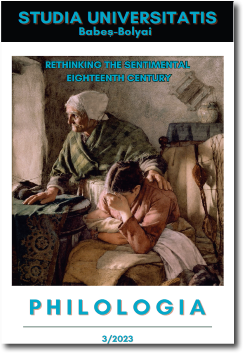HUMOUR AS AFFECT IN SUSANNA CENTLIVRE’S PLAY A BOLD STROKE FOR A WIFE
DOI:
https://doi.org/10.24193/subbphilo.2023.3.02Keywords:
eighteenth-century drama, comedy, affect theory, empathy, ethics.Abstract
Humour as Affect in Susanna Centlivre’s Play A Bold Stroke for a Wife. Susanna Centlivre’s plays are conceived in a cultural climate of moral debate and ideological reconsideration of values such as virtue, goodness and liberty. Centlivre’s use of humour becomes an ethical instrument and shows eighteenth-century audiences how liberty and freedom triumph over the excesses and follies of opposing figures such as parents and guardians. On the one hand, Centlivre’s comic playwriting creates an empathetic drama in which the female heroines are virtuous and elicit edifying responses from the audience and, on the other, the comic experience, following Bakhtin’s notion of laughter and the comic, enables freedom from the socially conventional notion of selfhood, thus making space for a re-orientation of values and norms.
REZUMAT. Umorul ca afect în piesa A Bold Stroke for a Wife de Susanna Centlivre. Piesele Susannei Centlivre sunt concepute într-un climat cultural al dezbaterilor morale și al reevaluării ideologice a valorilor precum virtutea, bunătatea și libertatea. Umorul lui Centlivre devine un instrument etic, arătându-i publicului de secol XVIII cum triumfă libertatea și eliberarea asupra exceselor și viciilor unor figuri antitetice, precum părinții și protectorii. Pe de o parte, piesele comice ale lui Centlivre creează un tip de teatru empatic, în care eroinele sunt virtuoase și primesc răspunsuri edificatoare din partea publicului. Pe de altă parte, folosind teoria lui Bahtin despre râs și comic, experiența comică permite eliberarea de noțiunea convențională, din punct de vedere social, de individualitate, făcând astfel loc unei reorientări a valorilor și normelor.
Cuvinte-cheie: teatrul secolului al XVIII-lea, comedie, teoria afectelor, empatie, etică.
Article history: Received 7 June 2023; Revised 17 August 2023; Accepted 12 September 2023;Available online 30 September 2023; Available print 30 September 2023.
References
Ahmed, Sara. 2014. The Cultural Politics of Emotion. Edinburgh University Press.
Anderson, Misty. 2002. Female Playwrights and Eighteenth-Century Comedy. Negotiating Marriage on the London Stage. Basingstoke: Palgrave Macmillan,
Bevis, Richard. 1988. English Drama: Restoration and Eighteenth Century, 1660-1789. London: Longman.
Brown, Laura. 1981. English Dramatic Form, 1660-1760: An Essay in Generic History. New Haven: Yale University Press.
Butler, Douglas R. 1991. “Plot and Politics in Susanna Centlivre’s A Bold Stroke For A Wife." In Curtain Calls: British and American Women and the Theatre, 1660-1820, edited by M. A. Schofield/C. Macheski, 357–70. Athens: Ohio University Press.
Canfield, Douglas. 1995. Cultural Readings of Restoration and Eighteenth‐Century English Theatre. Athens: University of Georgia Press.
Centlivre, Susanna. (1718) 2005. A Bold Stroke for a Wife. Edited by Nancy Copeland, Ontario: Broadview Press.
Combe, K. 2001. “Rakes, Wives and Merchants: Shifts from the Satirical to the Sentimental.” In A Companion to Restoration Drama, edited by S.J. Owen, 291-308. Oxford: Blackwell.
Corman, Brian. 2021. “Form.” In A Cultural History of Comedy in the Age of Enlightenment, edited by Elizabeth Kraft, 27-48. London: Bloomsbury.
Csengei, Ildiko. 2012. Sympathy, Sensibility and the Literature of Feeling in the Eighteenth Century. Basingstoke: Palgrave Macmillan.
Edwards, Pamela. 2002. “Political Ideas from Locke to Paine.” In A Companion to Eighteenth-Century Britain, edited by H.T. Dickinson, 294-310. Oxford: Blackwell.
Heard, Elisabeth J. 2014. Experimentation on the English Stage, 1695-1708. London: Pickering and Chatto.
Horlacher, Stefan. 2009. “A Short Introduction to Theories of Humour, the Comic and Laughter.” In Gender and Laughter: Comic Affirmation and Subversion in Traditional and Modern Media, edited by Gaby Pailer, Andreas Böhn, Stefan Horlacher, and Ulrich Scheck, 17-47. Leiden: Brill Rodopi.
Konigsberg, Ira. 2015. Samuel Richardson and the Dramatic Novel. Lexington: University Press of Kentucky.
O'Brien, John. 2001. “Busy Bodies: The Plots of Susanna Centlivre.” In Eighteenth-Century Genre and Culture: Serious Reflections on Occasional Forms: Essays in Honor of J. Paul Hunter, edited by Todd, Dennis, Cynthia Wall, and J. Paul Hunter, 165-89. Newark: University of Delaware Press.
Pincus, Steve. 2009. 1688: The First Modern Revolution. New Haven: Yale University Press.
Reckwitz, Andreas. 2012. “Affective Spaces: A Praxeological Outlook.” Rethinking History 16, no. 2: 241-58.
Sanders, Andrew. 2000. The Short Oxford History of English Literature. 2nd ed. Oxford: Oxford University Press.
Scheer, Monique, Fadil, Nadia, and Brigitte Schepelern Johansen. 2019. Secular Bodies, Affects and Emotions: European Configurations. London: Bloomsbury Academic.
Sidney, Philip. (1595). “A Defence of Poesie and Poems.” Urbana, Illinois: Project Gutenberg. Retrieved September 9, 2023, from https://www.gutenberg.org/files/1962/1962-h/1962-h.htm
Downloads
Published
How to Cite
Issue
Section
License
Copyright (c) 2023 Studia Universitatis Babeș-Bolyai Philologia

This work is licensed under a Creative Commons Attribution-NonCommercial-NoDerivatives 4.0 International License.





 ©Studia Universitatis Babeş-Bolyai Philologia. Published by Babeș-Bolyai University.
©Studia Universitatis Babeş-Bolyai Philologia. Published by Babeș-Bolyai University.